Sustainable and Responsible Tourism Development and Management
VerifiedAdded on 2023/06/15
|13
|4358
|357
Report
AI Summary
This report provides an overview of sustainable and responsible tourism management, with a focus on Paris. It examines the evolution of sustainable tourism, the roles of global organizations like the UNWTO, and the principles and processes of tourism development and planning aimed at minimizing adverse effects. The report assesses the economic, social, cultural, and environmental impacts of tourism activities in Paris, and how sustainability principles are implemented to meet stakeholder expectations. It further explores how sustainability is developed and managed in various tourist destinations worldwide, using Paris as a case study. The report highlights Paris's efforts to become a leading green city through initiatives like low-impact transport, eco-friendly accommodations, and sustainable urban planning, including improving energy efficiency in buildings and promoting public transport. The conclusion offers solutions and recommendations for enhancing sustainable tourism practices.
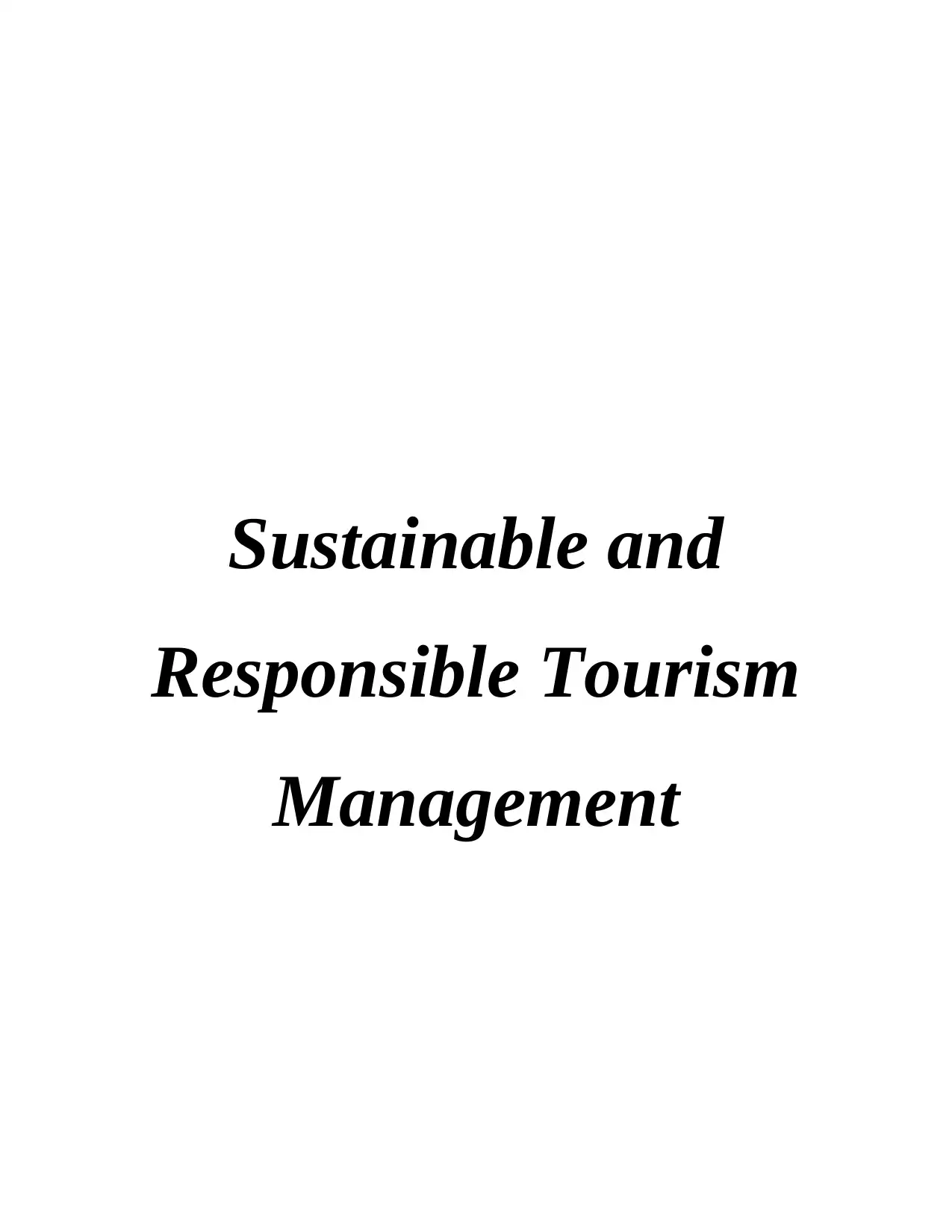
Sustainable and
Responsible Tourism
Management
Responsible Tourism
Management
Paraphrase This Document
Need a fresh take? Get an instant paraphrase of this document with our AI Paraphraser
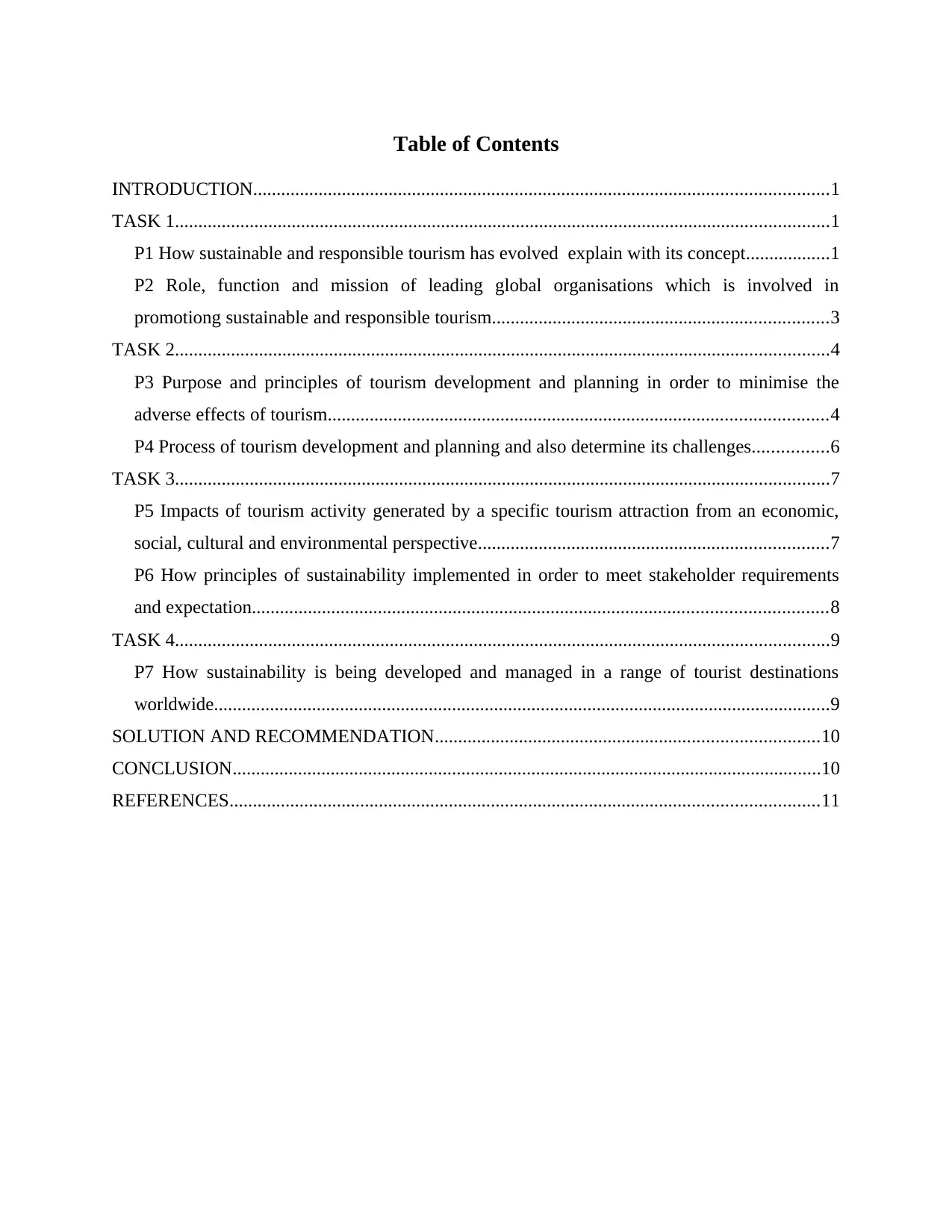
Table of Contents
INTRODUCTION...........................................................................................................................1
TASK 1............................................................................................................................................1
P1 How sustainable and responsible tourism has evolved explain with its concept..................1
P2 Role, function and mission of leading global organisations which is involved in
promotiong sustainable and responsible tourism........................................................................3
TASK 2............................................................................................................................................4
P3 Purpose and principles of tourism development and planning in order to minimise the
adverse effects of tourism...........................................................................................................4
P4 Process of tourism development and planning and also determine its challenges................6
TASK 3............................................................................................................................................7
P5 Impacts of tourism activity generated by a specific tourism attraction from an economic,
social, cultural and environmental perspective...........................................................................7
P6 How principles of sustainability implemented in order to meet stakeholder requirements
and expectation...........................................................................................................................8
TASK 4............................................................................................................................................9
P7 How sustainability is being developed and managed in a range of tourist destinations
worldwide....................................................................................................................................9
SOLUTION AND RECOMMENDATION..................................................................................10
CONCLUSION..............................................................................................................................10
REFERENCES..............................................................................................................................11
INTRODUCTION...........................................................................................................................1
TASK 1............................................................................................................................................1
P1 How sustainable and responsible tourism has evolved explain with its concept..................1
P2 Role, function and mission of leading global organisations which is involved in
promotiong sustainable and responsible tourism........................................................................3
TASK 2............................................................................................................................................4
P3 Purpose and principles of tourism development and planning in order to minimise the
adverse effects of tourism...........................................................................................................4
P4 Process of tourism development and planning and also determine its challenges................6
TASK 3............................................................................................................................................7
P5 Impacts of tourism activity generated by a specific tourism attraction from an economic,
social, cultural and environmental perspective...........................................................................7
P6 How principles of sustainability implemented in order to meet stakeholder requirements
and expectation...........................................................................................................................8
TASK 4............................................................................................................................................9
P7 How sustainability is being developed and managed in a range of tourist destinations
worldwide....................................................................................................................................9
SOLUTION AND RECOMMENDATION..................................................................................10
CONCLUSION..............................................................................................................................10
REFERENCES..............................................................................................................................11
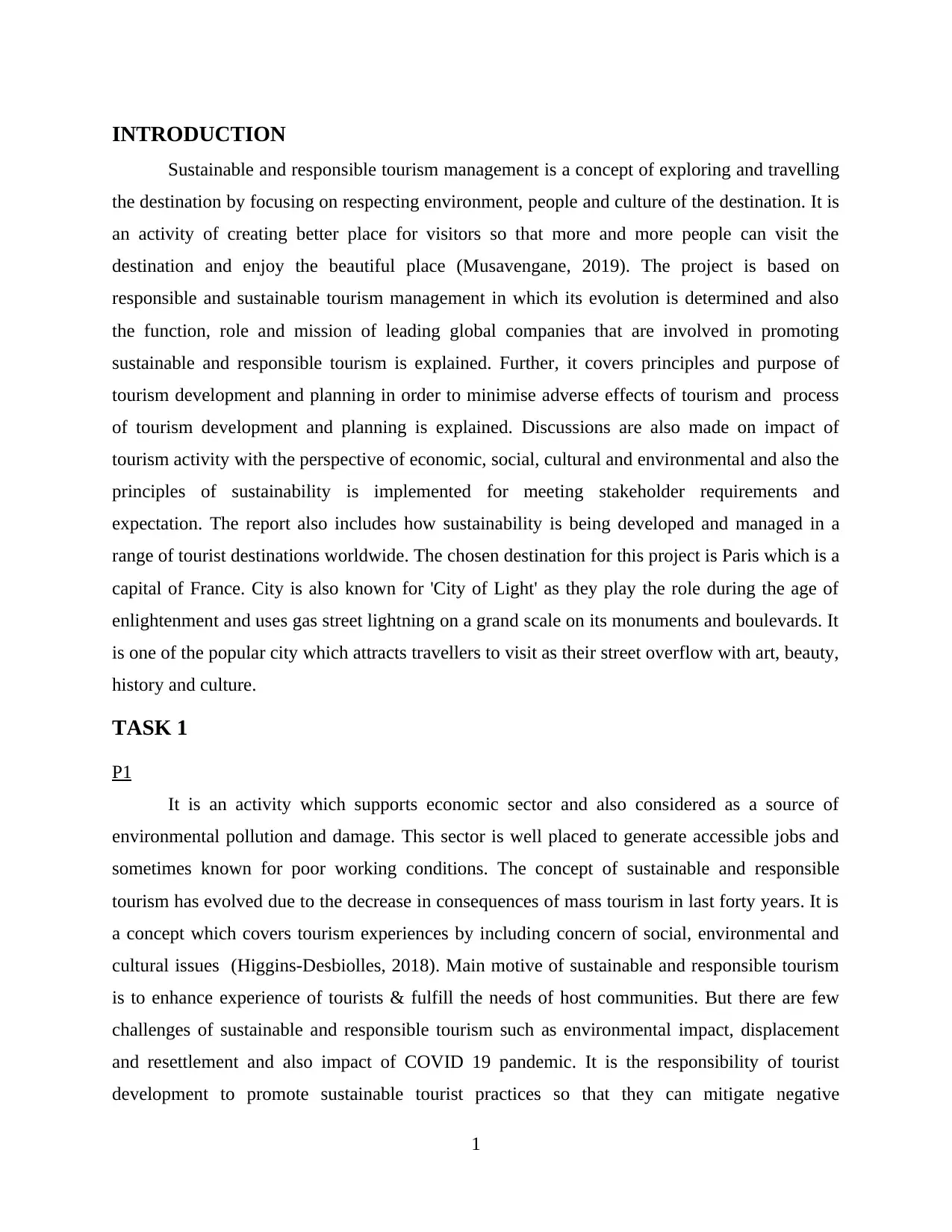
INTRODUCTION
Sustainable and responsible tourism management is a concept of exploring and travelling
the destination by focusing on respecting environment, people and culture of the destination. It is
an activity of creating better place for visitors so that more and more people can visit the
destination and enjoy the beautiful place (Musavengane, 2019). The project is based on
responsible and sustainable tourism management in which its evolution is determined and also
the function, role and mission of leading global companies that are involved in promoting
sustainable and responsible tourism is explained. Further, it covers principles and purpose of
tourism development and planning in order to minimise adverse effects of tourism and process
of tourism development and planning is explained. Discussions are also made on impact of
tourism activity with the perspective of economic, social, cultural and environmental and also the
principles of sustainability is implemented for meeting stakeholder requirements and
expectation. The report also includes how sustainability is being developed and managed in a
range of tourist destinations worldwide. The chosen destination for this project is Paris which is a
capital of France. City is also known for 'City of Light' as they play the role during the age of
enlightenment and uses gas street lightning on a grand scale on its monuments and boulevards. It
is one of the popular city which attracts travellers to visit as their street overflow with art, beauty,
history and culture.
TASK 1
P1
It is an activity which supports economic sector and also considered as a source of
environmental pollution and damage. This sector is well placed to generate accessible jobs and
sometimes known for poor working conditions. The concept of sustainable and responsible
tourism has evolved due to the decrease in consequences of mass tourism in last forty years. It is
a concept which covers tourism experiences by including concern of social, environmental and
cultural issues (Higgins-Desbiolles, 2018). Main motive of sustainable and responsible tourism
is to enhance experience of tourists & fulfill the needs of host communities. But there are few
challenges of sustainable and responsible tourism such as environmental impact, displacement
and resettlement and also impact of COVID 19 pandemic. It is the responsibility of tourist
development to promote sustainable tourist practices so that they can mitigate negative
1
Sustainable and responsible tourism management is a concept of exploring and travelling
the destination by focusing on respecting environment, people and culture of the destination. It is
an activity of creating better place for visitors so that more and more people can visit the
destination and enjoy the beautiful place (Musavengane, 2019). The project is based on
responsible and sustainable tourism management in which its evolution is determined and also
the function, role and mission of leading global companies that are involved in promoting
sustainable and responsible tourism is explained. Further, it covers principles and purpose of
tourism development and planning in order to minimise adverse effects of tourism and process
of tourism development and planning is explained. Discussions are also made on impact of
tourism activity with the perspective of economic, social, cultural and environmental and also the
principles of sustainability is implemented for meeting stakeholder requirements and
expectation. The report also includes how sustainability is being developed and managed in a
range of tourist destinations worldwide. The chosen destination for this project is Paris which is a
capital of France. City is also known for 'City of Light' as they play the role during the age of
enlightenment and uses gas street lightning on a grand scale on its monuments and boulevards. It
is one of the popular city which attracts travellers to visit as their street overflow with art, beauty,
history and culture.
TASK 1
P1
It is an activity which supports economic sector and also considered as a source of
environmental pollution and damage. This sector is well placed to generate accessible jobs and
sometimes known for poor working conditions. The concept of sustainable and responsible
tourism has evolved due to the decrease in consequences of mass tourism in last forty years. It is
a concept which covers tourism experiences by including concern of social, environmental and
cultural issues (Higgins-Desbiolles, 2018). Main motive of sustainable and responsible tourism
is to enhance experience of tourists & fulfill the needs of host communities. But there are few
challenges of sustainable and responsible tourism such as environmental impact, displacement
and resettlement and also impact of COVID 19 pandemic. It is the responsibility of tourist
development to promote sustainable tourist practices so that they can mitigate negative
1
⊘ This is a preview!⊘
Do you want full access?
Subscribe today to unlock all pages.

Trusted by 1+ million students worldwide
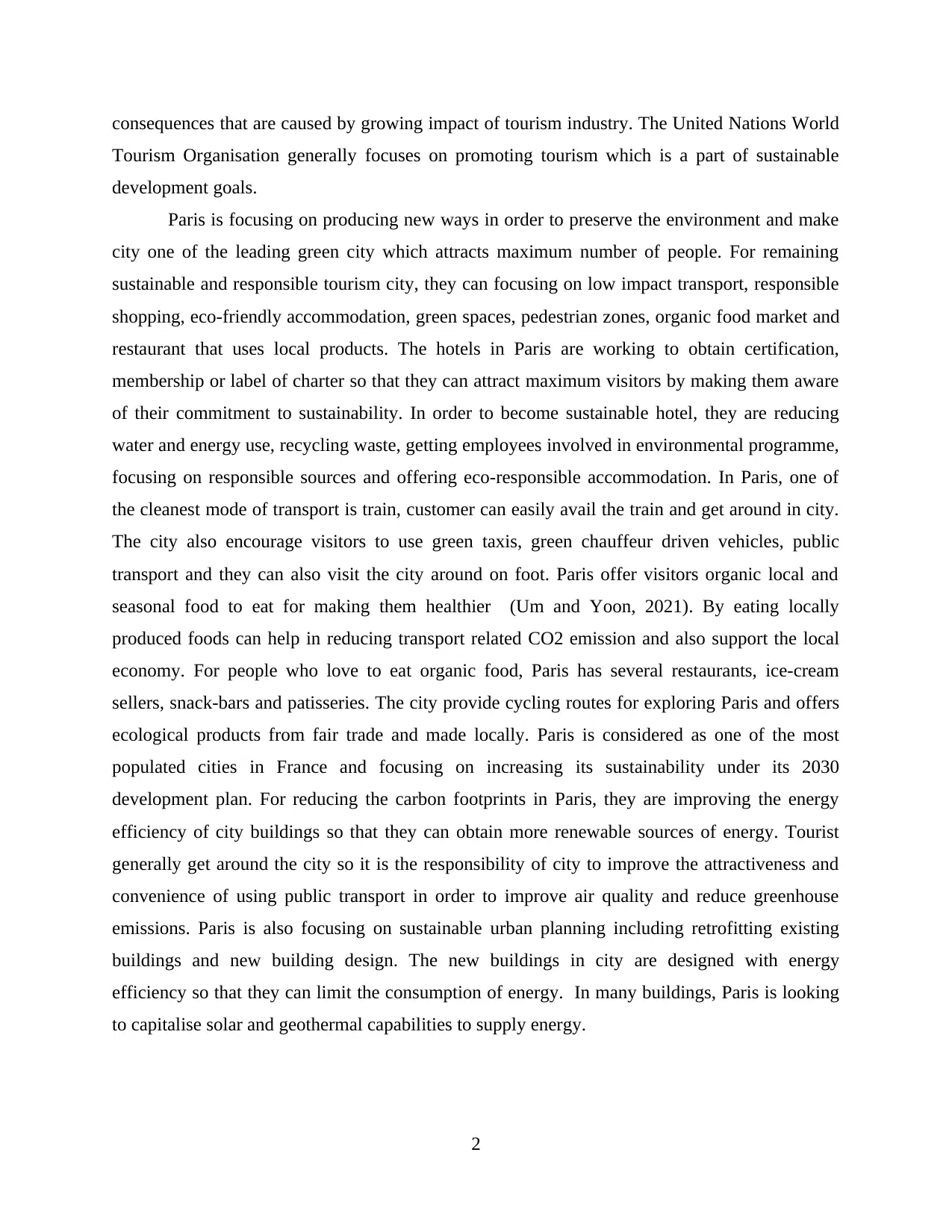
consequences that are caused by growing impact of tourism industry. The United Nations World
Tourism Organisation generally focuses on promoting tourism which is a part of sustainable
development goals.
Paris is focusing on producing new ways in order to preserve the environment and make
city one of the leading green city which attracts maximum number of people. For remaining
sustainable and responsible tourism city, they can focusing on low impact transport, responsible
shopping, eco-friendly accommodation, green spaces, pedestrian zones, organic food market and
restaurant that uses local products. The hotels in Paris are working to obtain certification,
membership or label of charter so that they can attract maximum visitors by making them aware
of their commitment to sustainability. In order to become sustainable hotel, they are reducing
water and energy use, recycling waste, getting employees involved in environmental programme,
focusing on responsible sources and offering eco-responsible accommodation. In Paris, one of
the cleanest mode of transport is train, customer can easily avail the train and get around in city.
The city also encourage visitors to use green taxis, green chauffeur driven vehicles, public
transport and they can also visit the city around on foot. Paris offer visitors organic local and
seasonal food to eat for making them healthier (Um and Yoon, 2021). By eating locally
produced foods can help in reducing transport related CO2 emission and also support the local
economy. For people who love to eat organic food, Paris has several restaurants, ice-cream
sellers, snack-bars and patisseries. The city provide cycling routes for exploring Paris and offers
ecological products from fair trade and made locally. Paris is considered as one of the most
populated cities in France and focusing on increasing its sustainability under its 2030
development plan. For reducing the carbon footprints in Paris, they are improving the energy
efficiency of city buildings so that they can obtain more renewable sources of energy. Tourist
generally get around the city so it is the responsibility of city to improve the attractiveness and
convenience of using public transport in order to improve air quality and reduce greenhouse
emissions. Paris is also focusing on sustainable urban planning including retrofitting existing
buildings and new building design. The new buildings in city are designed with energy
efficiency so that they can limit the consumption of energy. In many buildings, Paris is looking
to capitalise solar and geothermal capabilities to supply energy.
2
Tourism Organisation generally focuses on promoting tourism which is a part of sustainable
development goals.
Paris is focusing on producing new ways in order to preserve the environment and make
city one of the leading green city which attracts maximum number of people. For remaining
sustainable and responsible tourism city, they can focusing on low impact transport, responsible
shopping, eco-friendly accommodation, green spaces, pedestrian zones, organic food market and
restaurant that uses local products. The hotels in Paris are working to obtain certification,
membership or label of charter so that they can attract maximum visitors by making them aware
of their commitment to sustainability. In order to become sustainable hotel, they are reducing
water and energy use, recycling waste, getting employees involved in environmental programme,
focusing on responsible sources and offering eco-responsible accommodation. In Paris, one of
the cleanest mode of transport is train, customer can easily avail the train and get around in city.
The city also encourage visitors to use green taxis, green chauffeur driven vehicles, public
transport and they can also visit the city around on foot. Paris offer visitors organic local and
seasonal food to eat for making them healthier (Um and Yoon, 2021). By eating locally
produced foods can help in reducing transport related CO2 emission and also support the local
economy. For people who love to eat organic food, Paris has several restaurants, ice-cream
sellers, snack-bars and patisseries. The city provide cycling routes for exploring Paris and offers
ecological products from fair trade and made locally. Paris is considered as one of the most
populated cities in France and focusing on increasing its sustainability under its 2030
development plan. For reducing the carbon footprints in Paris, they are improving the energy
efficiency of city buildings so that they can obtain more renewable sources of energy. Tourist
generally get around the city so it is the responsibility of city to improve the attractiveness and
convenience of using public transport in order to improve air quality and reduce greenhouse
emissions. Paris is also focusing on sustainable urban planning including retrofitting existing
buildings and new building design. The new buildings in city are designed with energy
efficiency so that they can limit the consumption of energy. In many buildings, Paris is looking
to capitalise solar and geothermal capabilities to supply energy.
2
Paraphrase This Document
Need a fresh take? Get an instant paraphrase of this document with our AI Paraphraser
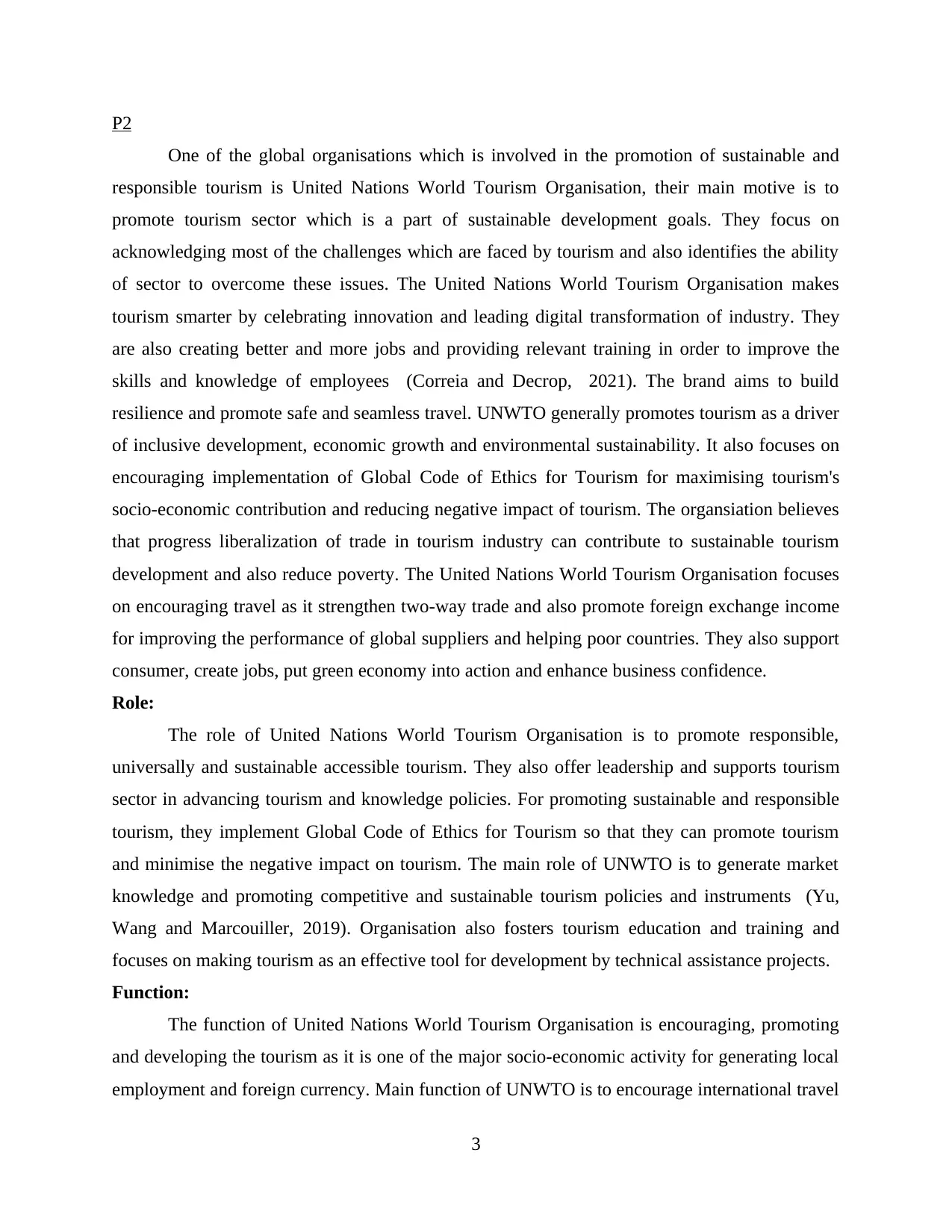
P2
One of the global organisations which is involved in the promotion of sustainable and
responsible tourism is United Nations World Tourism Organisation, their main motive is to
promote tourism sector which is a part of sustainable development goals. They focus on
acknowledging most of the challenges which are faced by tourism and also identifies the ability
of sector to overcome these issues. The United Nations World Tourism Organisation makes
tourism smarter by celebrating innovation and leading digital transformation of industry. They
are also creating better and more jobs and providing relevant training in order to improve the
skills and knowledge of employees (Correia and Decrop, 2021). The brand aims to build
resilience and promote safe and seamless travel. UNWTO generally promotes tourism as a driver
of inclusive development, economic growth and environmental sustainability. It also focuses on
encouraging implementation of Global Code of Ethics for Tourism for maximising tourism's
socio-economic contribution and reducing negative impact of tourism. The organsiation believes
that progress liberalization of trade in tourism industry can contribute to sustainable tourism
development and also reduce poverty. The United Nations World Tourism Organisation focuses
on encouraging travel as it strengthen two-way trade and also promote foreign exchange income
for improving the performance of global suppliers and helping poor countries. They also support
consumer, create jobs, put green economy into action and enhance business confidence.
Role:
The role of United Nations World Tourism Organisation is to promote responsible,
universally and sustainable accessible tourism. They also offer leadership and supports tourism
sector in advancing tourism and knowledge policies. For promoting sustainable and responsible
tourism, they implement Global Code of Ethics for Tourism so that they can promote tourism
and minimise the negative impact on tourism. The main role of UNWTO is to generate market
knowledge and promoting competitive and sustainable tourism policies and instruments (Yu,
Wang and Marcouiller, 2019). Organisation also fosters tourism education and training and
focuses on making tourism as an effective tool for development by technical assistance projects.
Function:
The function of United Nations World Tourism Organisation is encouraging, promoting
and developing the tourism as it is one of the major socio-economic activity for generating local
employment and foreign currency. Main function of UNWTO is to encourage international travel
3
One of the global organisations which is involved in the promotion of sustainable and
responsible tourism is United Nations World Tourism Organisation, their main motive is to
promote tourism sector which is a part of sustainable development goals. They focus on
acknowledging most of the challenges which are faced by tourism and also identifies the ability
of sector to overcome these issues. The United Nations World Tourism Organisation makes
tourism smarter by celebrating innovation and leading digital transformation of industry. They
are also creating better and more jobs and providing relevant training in order to improve the
skills and knowledge of employees (Correia and Decrop, 2021). The brand aims to build
resilience and promote safe and seamless travel. UNWTO generally promotes tourism as a driver
of inclusive development, economic growth and environmental sustainability. It also focuses on
encouraging implementation of Global Code of Ethics for Tourism for maximising tourism's
socio-economic contribution and reducing negative impact of tourism. The organsiation believes
that progress liberalization of trade in tourism industry can contribute to sustainable tourism
development and also reduce poverty. The United Nations World Tourism Organisation focuses
on encouraging travel as it strengthen two-way trade and also promote foreign exchange income
for improving the performance of global suppliers and helping poor countries. They also support
consumer, create jobs, put green economy into action and enhance business confidence.
Role:
The role of United Nations World Tourism Organisation is to promote responsible,
universally and sustainable accessible tourism. They also offer leadership and supports tourism
sector in advancing tourism and knowledge policies. For promoting sustainable and responsible
tourism, they implement Global Code of Ethics for Tourism so that they can promote tourism
and minimise the negative impact on tourism. The main role of UNWTO is to generate market
knowledge and promoting competitive and sustainable tourism policies and instruments (Yu,
Wang and Marcouiller, 2019). Organisation also fosters tourism education and training and
focuses on making tourism as an effective tool for development by technical assistance projects.
Function:
The function of United Nations World Tourism Organisation is encouraging, promoting
and developing the tourism as it is one of the major socio-economic activity for generating local
employment and foreign currency. Main function of UNWTO is to encourage international travel
3
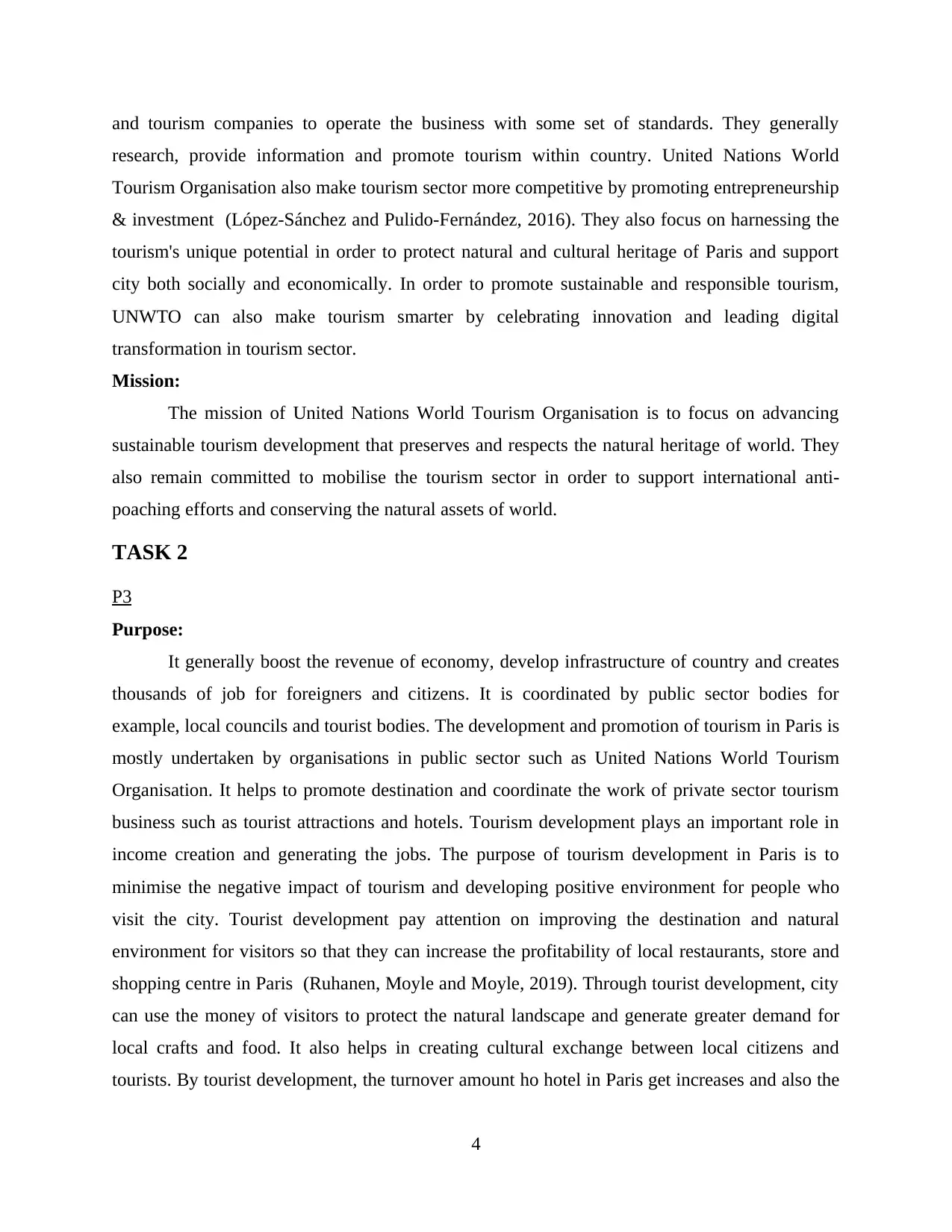
and tourism companies to operate the business with some set of standards. They generally
research, provide information and promote tourism within country. United Nations World
Tourism Organisation also make tourism sector more competitive by promoting entrepreneurship
& investment (López-Sánchez and Pulido-Fernández, 2016). They also focus on harnessing the
tourism's unique potential in order to protect natural and cultural heritage of Paris and support
city both socially and economically. In order to promote sustainable and responsible tourism,
UNWTO can also make tourism smarter by celebrating innovation and leading digital
transformation in tourism sector.
Mission:
The mission of United Nations World Tourism Organisation is to focus on advancing
sustainable tourism development that preserves and respects the natural heritage of world. They
also remain committed to mobilise the tourism sector in order to support international anti-
poaching efforts and conserving the natural assets of world.
TASK 2
P3
Purpose:
It generally boost the revenue of economy, develop infrastructure of country and creates
thousands of job for foreigners and citizens. It is coordinated by public sector bodies for
example, local councils and tourist bodies. The development and promotion of tourism in Paris is
mostly undertaken by organisations in public sector such as United Nations World Tourism
Organisation. It helps to promote destination and coordinate the work of private sector tourism
business such as tourist attractions and hotels. Tourism development plays an important role in
income creation and generating the jobs. The purpose of tourism development in Paris is to
minimise the negative impact of tourism and developing positive environment for people who
visit the city. Tourist development pay attention on improving the destination and natural
environment for visitors so that they can increase the profitability of local restaurants, store and
shopping centre in Paris (Ruhanen, Moyle and Moyle, 2019). Through tourist development, city
can use the money of visitors to protect the natural landscape and generate greater demand for
local crafts and food. It also helps in creating cultural exchange between local citizens and
tourists. By tourist development, the turnover amount ho hotel in Paris get increases and also the
4
research, provide information and promote tourism within country. United Nations World
Tourism Organisation also make tourism sector more competitive by promoting entrepreneurship
& investment (López-Sánchez and Pulido-Fernández, 2016). They also focus on harnessing the
tourism's unique potential in order to protect natural and cultural heritage of Paris and support
city both socially and economically. In order to promote sustainable and responsible tourism,
UNWTO can also make tourism smarter by celebrating innovation and leading digital
transformation in tourism sector.
Mission:
The mission of United Nations World Tourism Organisation is to focus on advancing
sustainable tourism development that preserves and respects the natural heritage of world. They
also remain committed to mobilise the tourism sector in order to support international anti-
poaching efforts and conserving the natural assets of world.
TASK 2
P3
Purpose:
It generally boost the revenue of economy, develop infrastructure of country and creates
thousands of job for foreigners and citizens. It is coordinated by public sector bodies for
example, local councils and tourist bodies. The development and promotion of tourism in Paris is
mostly undertaken by organisations in public sector such as United Nations World Tourism
Organisation. It helps to promote destination and coordinate the work of private sector tourism
business such as tourist attractions and hotels. Tourism development plays an important role in
income creation and generating the jobs. The purpose of tourism development in Paris is to
minimise the negative impact of tourism and developing positive environment for people who
visit the city. Tourist development pay attention on improving the destination and natural
environment for visitors so that they can increase the profitability of local restaurants, store and
shopping centre in Paris (Ruhanen, Moyle and Moyle, 2019). Through tourist development, city
can use the money of visitors to protect the natural landscape and generate greater demand for
local crafts and food. It also helps in creating cultural exchange between local citizens and
tourists. By tourist development, the turnover amount ho hotel in Paris get increases and also the
4
⊘ This is a preview!⊘
Do you want full access?
Subscribe today to unlock all pages.

Trusted by 1+ million students worldwide
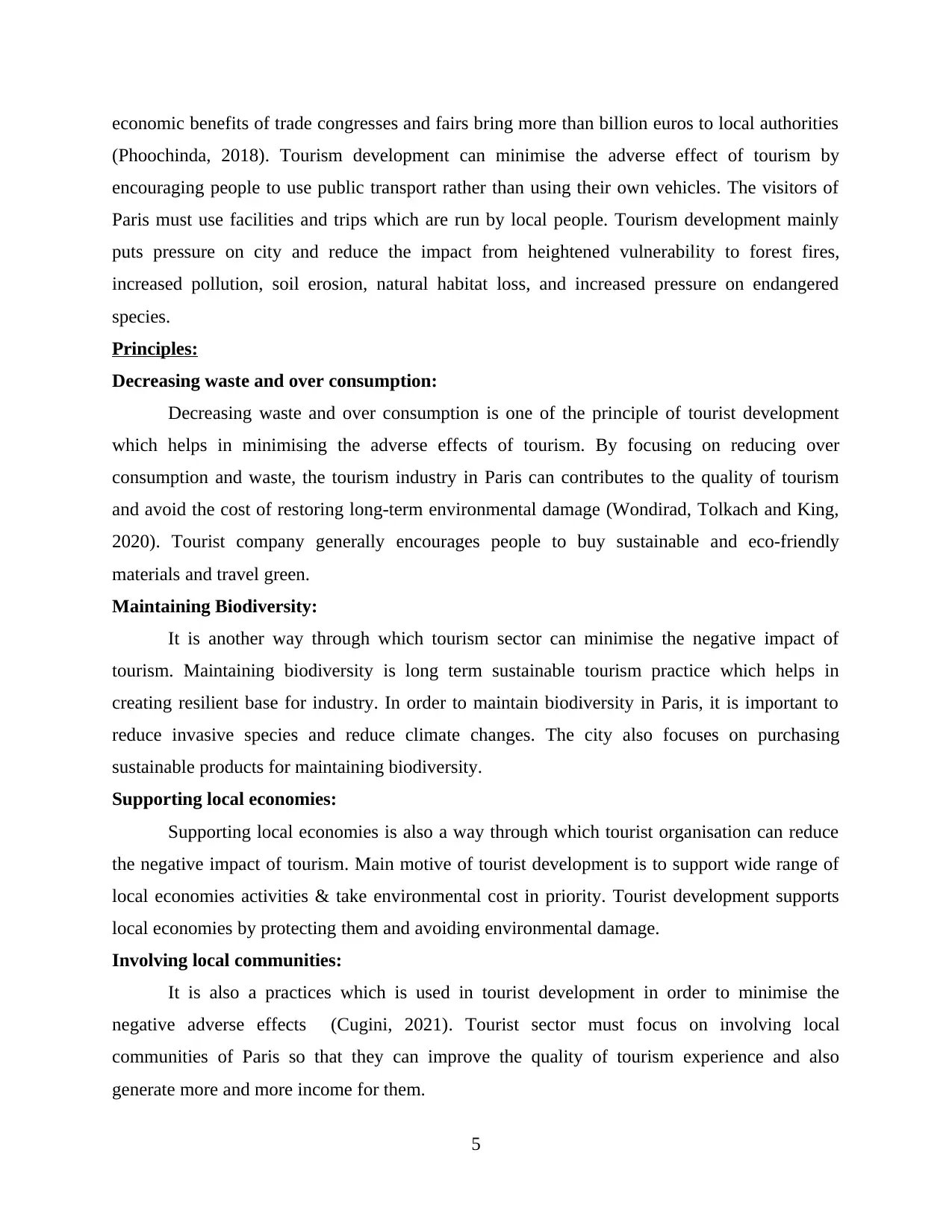
economic benefits of trade congresses and fairs bring more than billion euros to local authorities
(Phoochinda, 2018). Tourism development can minimise the adverse effect of tourism by
encouraging people to use public transport rather than using their own vehicles. The visitors of
Paris must use facilities and trips which are run by local people. Tourism development mainly
puts pressure on city and reduce the impact from heightened vulnerability to forest fires,
increased pollution, soil erosion, natural habitat loss, and increased pressure on endangered
species.
Principles:
Decreasing waste and over consumption:
Decreasing waste and over consumption is one of the principle of tourist development
which helps in minimising the adverse effects of tourism. By focusing on reducing over
consumption and waste, the tourism industry in Paris can contributes to the quality of tourism
and avoid the cost of restoring long-term environmental damage (Wondirad, Tolkach and King,
2020). Tourist company generally encourages people to buy sustainable and eco-friendly
materials and travel green.
Maintaining Biodiversity:
It is another way through which tourism sector can minimise the negative impact of
tourism. Maintaining biodiversity is long term sustainable tourism practice which helps in
creating resilient base for industry. In order to maintain biodiversity in Paris, it is important to
reduce invasive species and reduce climate changes. The city also focuses on purchasing
sustainable products for maintaining biodiversity.
Supporting local economies:
Supporting local economies is also a way through which tourist organisation can reduce
the negative impact of tourism. Main motive of tourist development is to support wide range of
local economies activities & take environmental cost in priority. Tourist development supports
local economies by protecting them and avoiding environmental damage.
Involving local communities:
It is also a practices which is used in tourist development in order to minimise the
negative adverse effects (Cugini, 2021). Tourist sector must focus on involving local
communities of Paris so that they can improve the quality of tourism experience and also
generate more and more income for them.
5
(Phoochinda, 2018). Tourism development can minimise the adverse effect of tourism by
encouraging people to use public transport rather than using their own vehicles. The visitors of
Paris must use facilities and trips which are run by local people. Tourism development mainly
puts pressure on city and reduce the impact from heightened vulnerability to forest fires,
increased pollution, soil erosion, natural habitat loss, and increased pressure on endangered
species.
Principles:
Decreasing waste and over consumption:
Decreasing waste and over consumption is one of the principle of tourist development
which helps in minimising the adverse effects of tourism. By focusing on reducing over
consumption and waste, the tourism industry in Paris can contributes to the quality of tourism
and avoid the cost of restoring long-term environmental damage (Wondirad, Tolkach and King,
2020). Tourist company generally encourages people to buy sustainable and eco-friendly
materials and travel green.
Maintaining Biodiversity:
It is another way through which tourism sector can minimise the negative impact of
tourism. Maintaining biodiversity is long term sustainable tourism practice which helps in
creating resilient base for industry. In order to maintain biodiversity in Paris, it is important to
reduce invasive species and reduce climate changes. The city also focuses on purchasing
sustainable products for maintaining biodiversity.
Supporting local economies:
Supporting local economies is also a way through which tourist organisation can reduce
the negative impact of tourism. Main motive of tourist development is to support wide range of
local economies activities & take environmental cost in priority. Tourist development supports
local economies by protecting them and avoiding environmental damage.
Involving local communities:
It is also a practices which is used in tourist development in order to minimise the
negative adverse effects (Cugini, 2021). Tourist sector must focus on involving local
communities of Paris so that they can improve the quality of tourism experience and also
generate more and more income for them.
5
Paraphrase This Document
Need a fresh take? Get an instant paraphrase of this document with our AI Paraphraser
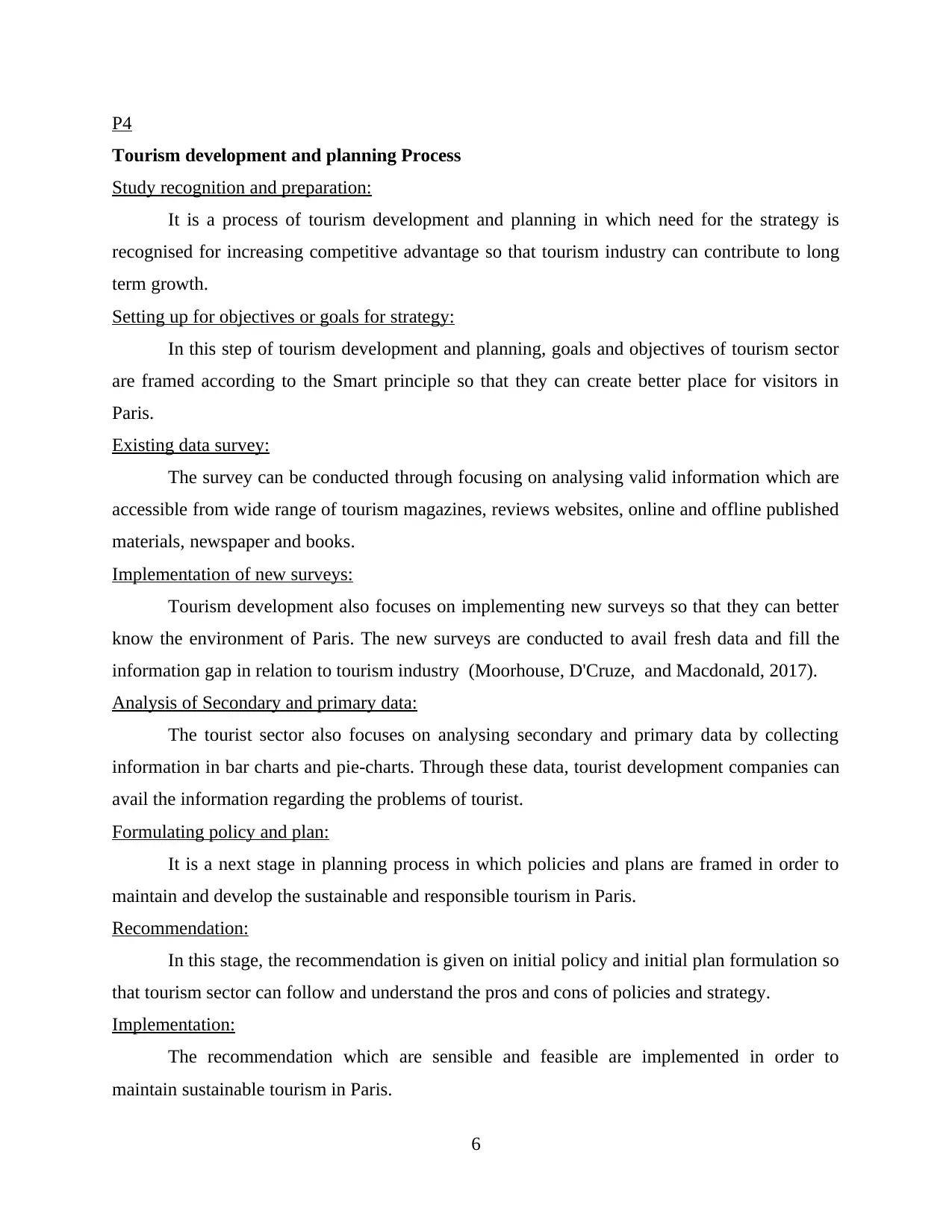
P4
Tourism development and planning Process
Study recognition and preparation:
It is a process of tourism development and planning in which need for the strategy is
recognised for increasing competitive advantage so that tourism industry can contribute to long
term growth.
Setting up for objectives or goals for strategy:
In this step of tourism development and planning, goals and objectives of tourism sector
are framed according to the Smart principle so that they can create better place for visitors in
Paris.
Existing data survey:
The survey can be conducted through focusing on analysing valid information which are
accessible from wide range of tourism magazines, reviews websites, online and offline published
materials, newspaper and books.
Implementation of new surveys:
Tourism development also focuses on implementing new surveys so that they can better
know the environment of Paris. The new surveys are conducted to avail fresh data and fill the
information gap in relation to tourism industry (Moorhouse, D'Cruze, and Macdonald, 2017).
Analysis of Secondary and primary data:
The tourist sector also focuses on analysing secondary and primary data by collecting
information in bar charts and pie-charts. Through these data, tourist development companies can
avail the information regarding the problems of tourist.
Formulating policy and plan:
It is a next stage in planning process in which policies and plans are framed in order to
maintain and develop the sustainable and responsible tourism in Paris.
Recommendation:
In this stage, the recommendation is given on initial policy and initial plan formulation so
that tourism sector can follow and understand the pros and cons of policies and strategy.
Implementation:
The recommendation which are sensible and feasible are implemented in order to
maintain sustainable tourism in Paris.
6
Tourism development and planning Process
Study recognition and preparation:
It is a process of tourism development and planning in which need for the strategy is
recognised for increasing competitive advantage so that tourism industry can contribute to long
term growth.
Setting up for objectives or goals for strategy:
In this step of tourism development and planning, goals and objectives of tourism sector
are framed according to the Smart principle so that they can create better place for visitors in
Paris.
Existing data survey:
The survey can be conducted through focusing on analysing valid information which are
accessible from wide range of tourism magazines, reviews websites, online and offline published
materials, newspaper and books.
Implementation of new surveys:
Tourism development also focuses on implementing new surveys so that they can better
know the environment of Paris. The new surveys are conducted to avail fresh data and fill the
information gap in relation to tourism industry (Moorhouse, D'Cruze, and Macdonald, 2017).
Analysis of Secondary and primary data:
The tourist sector also focuses on analysing secondary and primary data by collecting
information in bar charts and pie-charts. Through these data, tourist development companies can
avail the information regarding the problems of tourist.
Formulating policy and plan:
It is a next stage in planning process in which policies and plans are framed in order to
maintain and develop the sustainable and responsible tourism in Paris.
Recommendation:
In this stage, the recommendation is given on initial policy and initial plan formulation so
that tourism sector can follow and understand the pros and cons of policies and strategy.
Implementation:
The recommendation which are sensible and feasible are implemented in order to
maintain sustainable tourism in Paris.
6
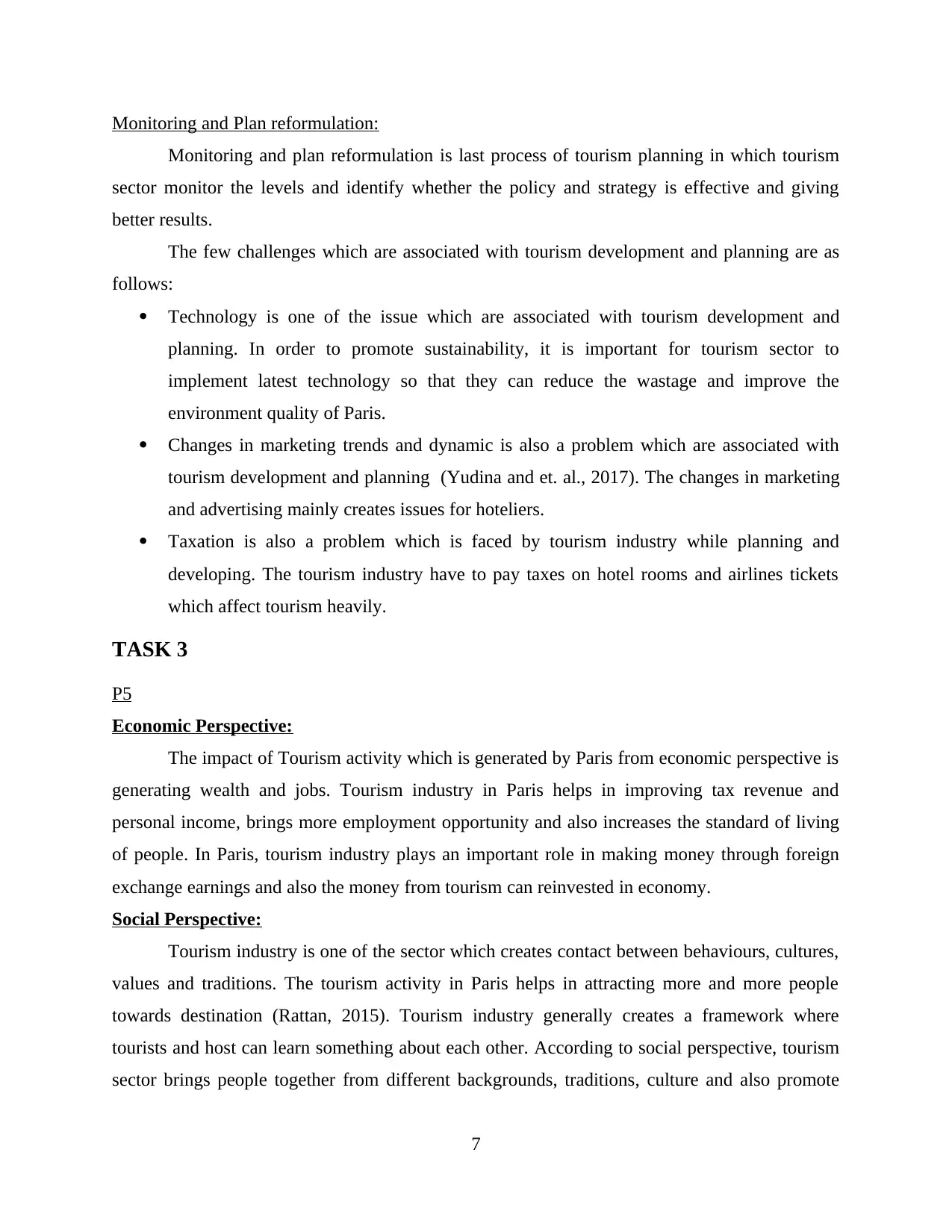
Monitoring and Plan reformulation:
Monitoring and plan reformulation is last process of tourism planning in which tourism
sector monitor the levels and identify whether the policy and strategy is effective and giving
better results.
The few challenges which are associated with tourism development and planning are as
follows:
Technology is one of the issue which are associated with tourism development and
planning. In order to promote sustainability, it is important for tourism sector to
implement latest technology so that they can reduce the wastage and improve the
environment quality of Paris.
Changes in marketing trends and dynamic is also a problem which are associated with
tourism development and planning (Yudina and et. al., 2017). The changes in marketing
and advertising mainly creates issues for hoteliers.
Taxation is also a problem which is faced by tourism industry while planning and
developing. The tourism industry have to pay taxes on hotel rooms and airlines tickets
which affect tourism heavily.
TASK 3
P5
Economic Perspective:
The impact of Tourism activity which is generated by Paris from economic perspective is
generating wealth and jobs. Tourism industry in Paris helps in improving tax revenue and
personal income, brings more employment opportunity and also increases the standard of living
of people. In Paris, tourism industry plays an important role in making money through foreign
exchange earnings and also the money from tourism can reinvested in economy.
Social Perspective:
Tourism industry is one of the sector which creates contact between behaviours, cultures,
values and traditions. The tourism activity in Paris helps in attracting more and more people
towards destination (Rattan, 2015). Tourism industry generally creates a framework where
tourists and host can learn something about each other. According to social perspective, tourism
sector brings people together from different backgrounds, traditions, culture and also promote
7
Monitoring and plan reformulation is last process of tourism planning in which tourism
sector monitor the levels and identify whether the policy and strategy is effective and giving
better results.
The few challenges which are associated with tourism development and planning are as
follows:
Technology is one of the issue which are associated with tourism development and
planning. In order to promote sustainability, it is important for tourism sector to
implement latest technology so that they can reduce the wastage and improve the
environment quality of Paris.
Changes in marketing trends and dynamic is also a problem which are associated with
tourism development and planning (Yudina and et. al., 2017). The changes in marketing
and advertising mainly creates issues for hoteliers.
Taxation is also a problem which is faced by tourism industry while planning and
developing. The tourism industry have to pay taxes on hotel rooms and airlines tickets
which affect tourism heavily.
TASK 3
P5
Economic Perspective:
The impact of Tourism activity which is generated by Paris from economic perspective is
generating wealth and jobs. Tourism industry in Paris helps in improving tax revenue and
personal income, brings more employment opportunity and also increases the standard of living
of people. In Paris, tourism industry plays an important role in making money through foreign
exchange earnings and also the money from tourism can reinvested in economy.
Social Perspective:
Tourism industry is one of the sector which creates contact between behaviours, cultures,
values and traditions. The tourism activity in Paris helps in attracting more and more people
towards destination (Rattan, 2015). Tourism industry generally creates a framework where
tourists and host can learn something about each other. According to social perspective, tourism
sector brings people together from different backgrounds, traditions, culture and also promote
7
⊘ This is a preview!⊘
Do you want full access?
Subscribe today to unlock all pages.

Trusted by 1+ million students worldwide
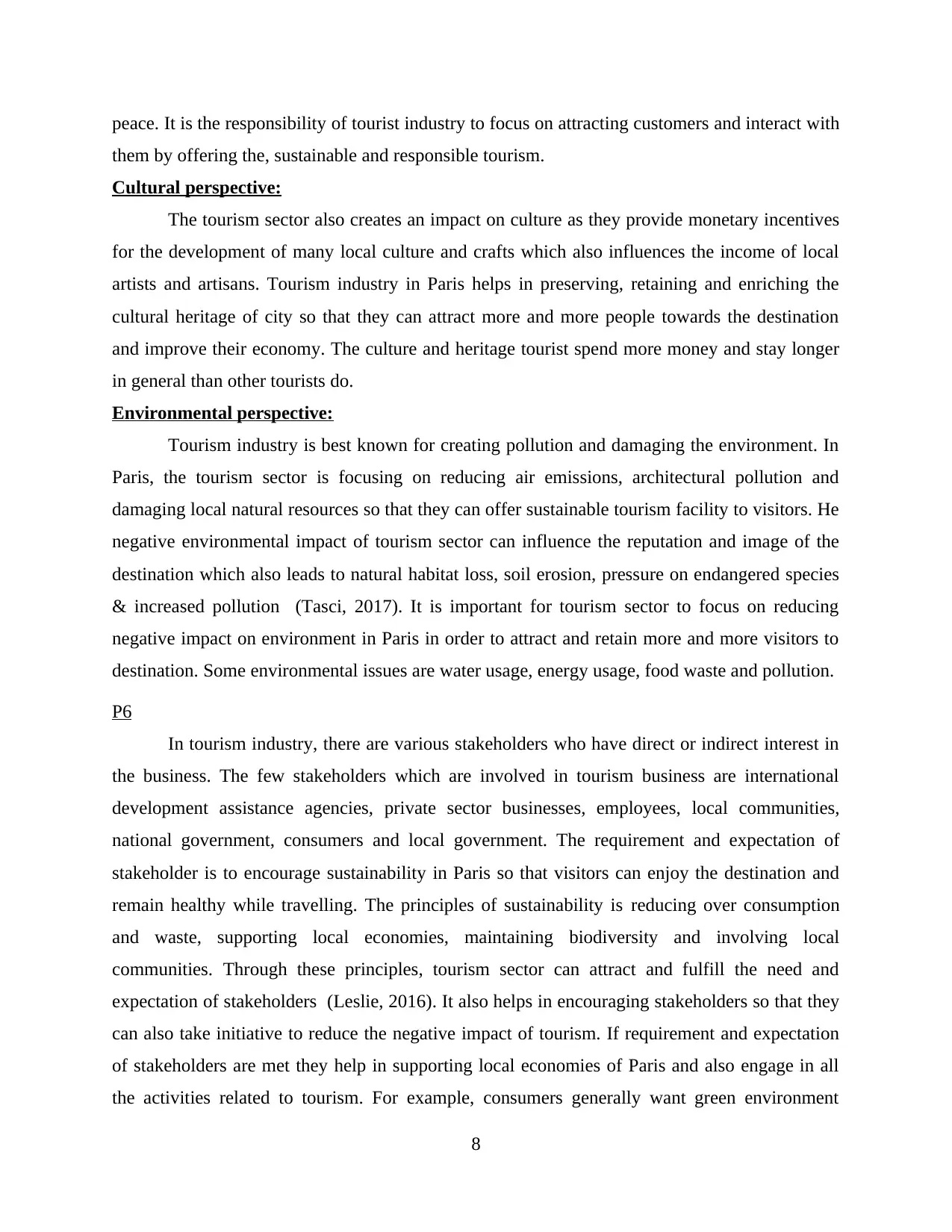
peace. It is the responsibility of tourist industry to focus on attracting customers and interact with
them by offering the, sustainable and responsible tourism.
Cultural perspective:
The tourism sector also creates an impact on culture as they provide monetary incentives
for the development of many local culture and crafts which also influences the income of local
artists and artisans. Tourism industry in Paris helps in preserving, retaining and enriching the
cultural heritage of city so that they can attract more and more people towards the destination
and improve their economy. The culture and heritage tourist spend more money and stay longer
in general than other tourists do.
Environmental perspective:
Tourism industry is best known for creating pollution and damaging the environment. In
Paris, the tourism sector is focusing on reducing air emissions, architectural pollution and
damaging local natural resources so that they can offer sustainable tourism facility to visitors. He
negative environmental impact of tourism sector can influence the reputation and image of the
destination which also leads to natural habitat loss, soil erosion, pressure on endangered species
& increased pollution (Tasci, 2017). It is important for tourism sector to focus on reducing
negative impact on environment in Paris in order to attract and retain more and more visitors to
destination. Some environmental issues are water usage, energy usage, food waste and pollution.
P6
In tourism industry, there are various stakeholders who have direct or indirect interest in
the business. The few stakeholders which are involved in tourism business are international
development assistance agencies, private sector businesses, employees, local communities,
national government, consumers and local government. The requirement and expectation of
stakeholder is to encourage sustainability in Paris so that visitors can enjoy the destination and
remain healthy while travelling. The principles of sustainability is reducing over consumption
and waste, supporting local economies, maintaining biodiversity and involving local
communities. Through these principles, tourism sector can attract and fulfill the need and
expectation of stakeholders (Leslie, 2016). It also helps in encouraging stakeholders so that they
can also take initiative to reduce the negative impact of tourism. If requirement and expectation
of stakeholders are met they help in supporting local economies of Paris and also engage in all
the activities related to tourism. For example, consumers generally want green environment
8
them by offering the, sustainable and responsible tourism.
Cultural perspective:
The tourism sector also creates an impact on culture as they provide monetary incentives
for the development of many local culture and crafts which also influences the income of local
artists and artisans. Tourism industry in Paris helps in preserving, retaining and enriching the
cultural heritage of city so that they can attract more and more people towards the destination
and improve their economy. The culture and heritage tourist spend more money and stay longer
in general than other tourists do.
Environmental perspective:
Tourism industry is best known for creating pollution and damaging the environment. In
Paris, the tourism sector is focusing on reducing air emissions, architectural pollution and
damaging local natural resources so that they can offer sustainable tourism facility to visitors. He
negative environmental impact of tourism sector can influence the reputation and image of the
destination which also leads to natural habitat loss, soil erosion, pressure on endangered species
& increased pollution (Tasci, 2017). It is important for tourism sector to focus on reducing
negative impact on environment in Paris in order to attract and retain more and more visitors to
destination. Some environmental issues are water usage, energy usage, food waste and pollution.
P6
In tourism industry, there are various stakeholders who have direct or indirect interest in
the business. The few stakeholders which are involved in tourism business are international
development assistance agencies, private sector businesses, employees, local communities,
national government, consumers and local government. The requirement and expectation of
stakeholder is to encourage sustainability in Paris so that visitors can enjoy the destination and
remain healthy while travelling. The principles of sustainability is reducing over consumption
and waste, supporting local economies, maintaining biodiversity and involving local
communities. Through these principles, tourism sector can attract and fulfill the need and
expectation of stakeholders (Leslie, 2016). It also helps in encouraging stakeholders so that they
can also take initiative to reduce the negative impact of tourism. If requirement and expectation
of stakeholders are met they help in supporting local economies of Paris and also engage in all
the activities related to tourism. For example, consumers generally want green environment
8
Paraphrase This Document
Need a fresh take? Get an instant paraphrase of this document with our AI Paraphraser
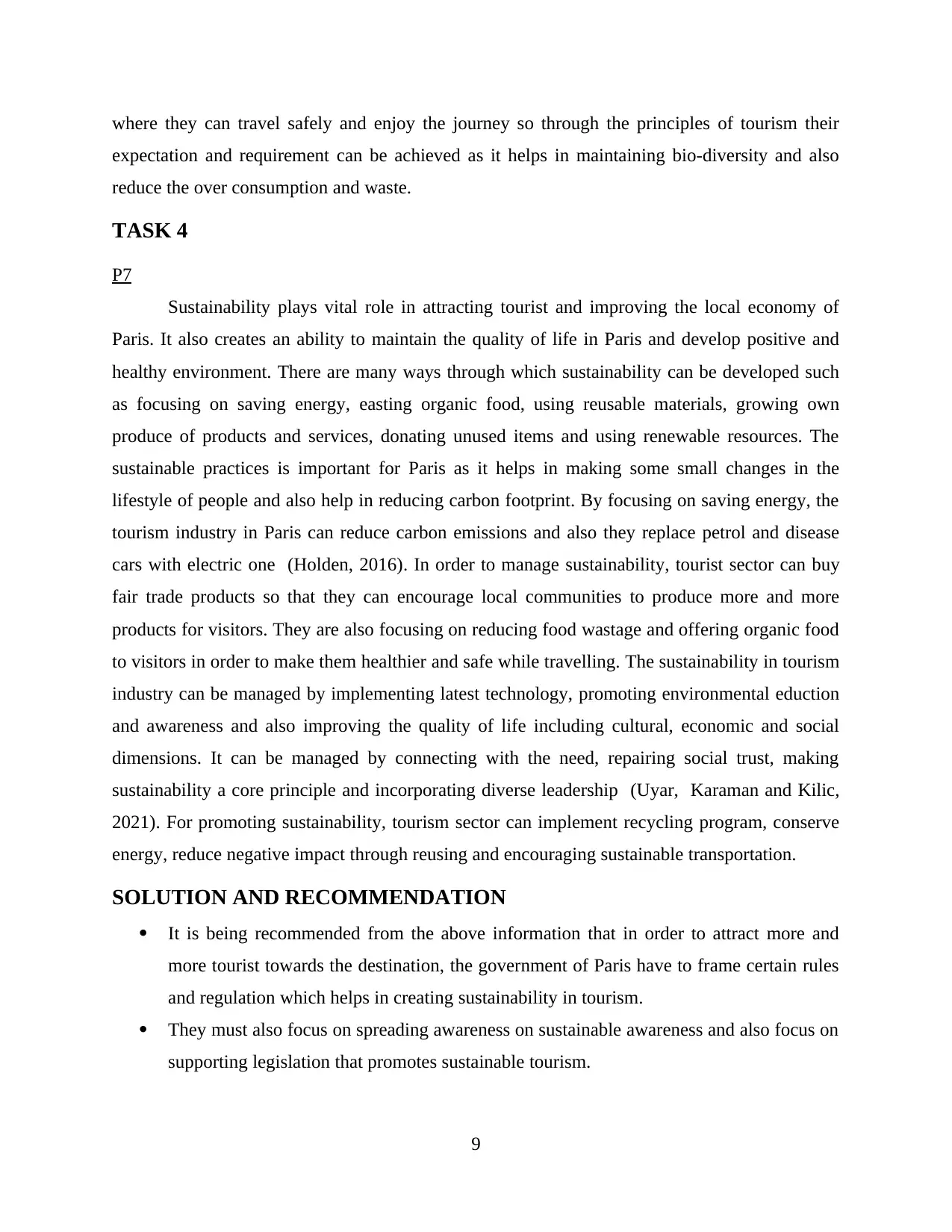
where they can travel safely and enjoy the journey so through the principles of tourism their
expectation and requirement can be achieved as it helps in maintaining bio-diversity and also
reduce the over consumption and waste.
TASK 4
P7
Sustainability plays vital role in attracting tourist and improving the local economy of
Paris. It also creates an ability to maintain the quality of life in Paris and develop positive and
healthy environment. There are many ways through which sustainability can be developed such
as focusing on saving energy, easting organic food, using reusable materials, growing own
produce of products and services, donating unused items and using renewable resources. The
sustainable practices is important for Paris as it helps in making some small changes in the
lifestyle of people and also help in reducing carbon footprint. By focusing on saving energy, the
tourism industry in Paris can reduce carbon emissions and also they replace petrol and disease
cars with electric one (Holden, 2016). In order to manage sustainability, tourist sector can buy
fair trade products so that they can encourage local communities to produce more and more
products for visitors. They are also focusing on reducing food wastage and offering organic food
to visitors in order to make them healthier and safe while travelling. The sustainability in tourism
industry can be managed by implementing latest technology, promoting environmental eduction
and awareness and also improving the quality of life including cultural, economic and social
dimensions. It can be managed by connecting with the need, repairing social trust, making
sustainability a core principle and incorporating diverse leadership (Uyar, Karaman and Kilic,
2021). For promoting sustainability, tourism sector can implement recycling program, conserve
energy, reduce negative impact through reusing and encouraging sustainable transportation.
SOLUTION AND RECOMMENDATION
It is being recommended from the above information that in order to attract more and
more tourist towards the destination, the government of Paris have to frame certain rules
and regulation which helps in creating sustainability in tourism.
They must also focus on spreading awareness on sustainable awareness and also focus on
supporting legislation that promotes sustainable tourism.
9
expectation and requirement can be achieved as it helps in maintaining bio-diversity and also
reduce the over consumption and waste.
TASK 4
P7
Sustainability plays vital role in attracting tourist and improving the local economy of
Paris. It also creates an ability to maintain the quality of life in Paris and develop positive and
healthy environment. There are many ways through which sustainability can be developed such
as focusing on saving energy, easting organic food, using reusable materials, growing own
produce of products and services, donating unused items and using renewable resources. The
sustainable practices is important for Paris as it helps in making some small changes in the
lifestyle of people and also help in reducing carbon footprint. By focusing on saving energy, the
tourism industry in Paris can reduce carbon emissions and also they replace petrol and disease
cars with electric one (Holden, 2016). In order to manage sustainability, tourist sector can buy
fair trade products so that they can encourage local communities to produce more and more
products for visitors. They are also focusing on reducing food wastage and offering organic food
to visitors in order to make them healthier and safe while travelling. The sustainability in tourism
industry can be managed by implementing latest technology, promoting environmental eduction
and awareness and also improving the quality of life including cultural, economic and social
dimensions. It can be managed by connecting with the need, repairing social trust, making
sustainability a core principle and incorporating diverse leadership (Uyar, Karaman and Kilic,
2021). For promoting sustainability, tourism sector can implement recycling program, conserve
energy, reduce negative impact through reusing and encouraging sustainable transportation.
SOLUTION AND RECOMMENDATION
It is being recommended from the above information that in order to attract more and
more tourist towards the destination, the government of Paris have to frame certain rules
and regulation which helps in creating sustainability in tourism.
They must also focus on spreading awareness on sustainable awareness and also focus on
supporting legislation that promotes sustainable tourism.
9
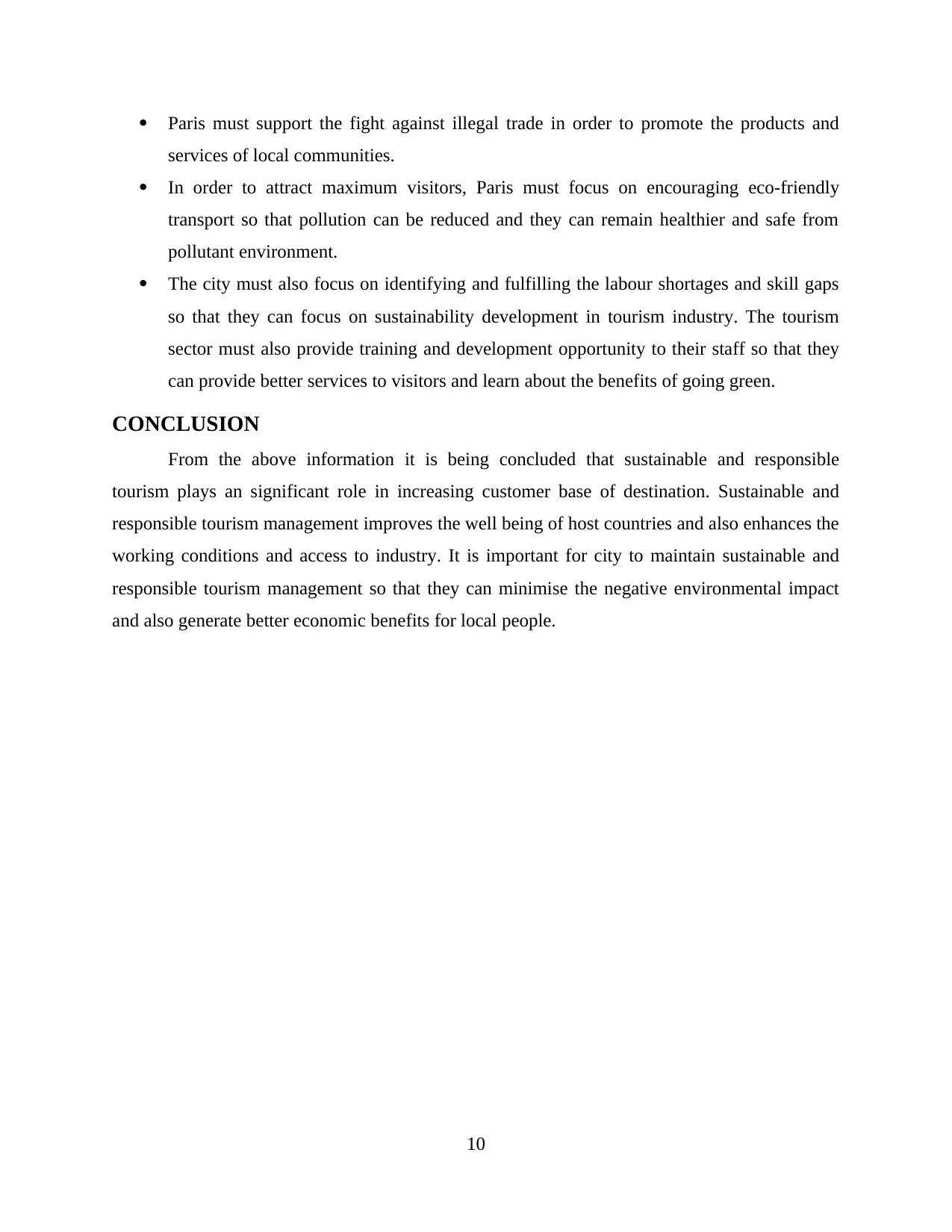
Paris must support the fight against illegal trade in order to promote the products and
services of local communities.
In order to attract maximum visitors, Paris must focus on encouraging eco-friendly
transport so that pollution can be reduced and they can remain healthier and safe from
pollutant environment.
The city must also focus on identifying and fulfilling the labour shortages and skill gaps
so that they can focus on sustainability development in tourism industry. The tourism
sector must also provide training and development opportunity to their staff so that they
can provide better services to visitors and learn about the benefits of going green.
CONCLUSION
From the above information it is being concluded that sustainable and responsible
tourism plays an significant role in increasing customer base of destination. Sustainable and
responsible tourism management improves the well being of host countries and also enhances the
working conditions and access to industry. It is important for city to maintain sustainable and
responsible tourism management so that they can minimise the negative environmental impact
and also generate better economic benefits for local people.
10
services of local communities.
In order to attract maximum visitors, Paris must focus on encouraging eco-friendly
transport so that pollution can be reduced and they can remain healthier and safe from
pollutant environment.
The city must also focus on identifying and fulfilling the labour shortages and skill gaps
so that they can focus on sustainability development in tourism industry. The tourism
sector must also provide training and development opportunity to their staff so that they
can provide better services to visitors and learn about the benefits of going green.
CONCLUSION
From the above information it is being concluded that sustainable and responsible
tourism plays an significant role in increasing customer base of destination. Sustainable and
responsible tourism management improves the well being of host countries and also enhances the
working conditions and access to industry. It is important for city to maintain sustainable and
responsible tourism management so that they can minimise the negative environmental impact
and also generate better economic benefits for local people.
10
⊘ This is a preview!⊘
Do you want full access?
Subscribe today to unlock all pages.

Trusted by 1+ million students worldwide
1 out of 13
Related Documents
Your All-in-One AI-Powered Toolkit for Academic Success.
+13062052269
info@desklib.com
Available 24*7 on WhatsApp / Email
![[object Object]](/_next/static/media/star-bottom.7253800d.svg)
Unlock your academic potential
Copyright © 2020–2025 A2Z Services. All Rights Reserved. Developed and managed by ZUCOL.



